Have you ever received an email that begins with “Hello pervert, I want to inform you about a very bad situation for you”, claiming extensive access to your accounts and devices, and even threatening to release compromising videos and browser history to your contacts? Don’t be alarmed—it’s a known scam.
These scammers use intimidation tactics, such as falsely claiming they have installed sophisticated spyware like Pegasus on your devices and accessed your personal email and webcam. They demand a ransom, typically in Bitcoin, and set a tight deadline to create urgency. This kind of email is a well-known example of a sextortion phishing scam.
We’re here to clarify that these threats are typically baseless and designed to exploit your fear. For a detailed explanation of this scam and effective strategies to deal with it, read our comprehensive article. Stay aware and safeguard yourself from these deceptive practices.
Here’s an example of the “I want to inform you about a very bad situation for you” email:
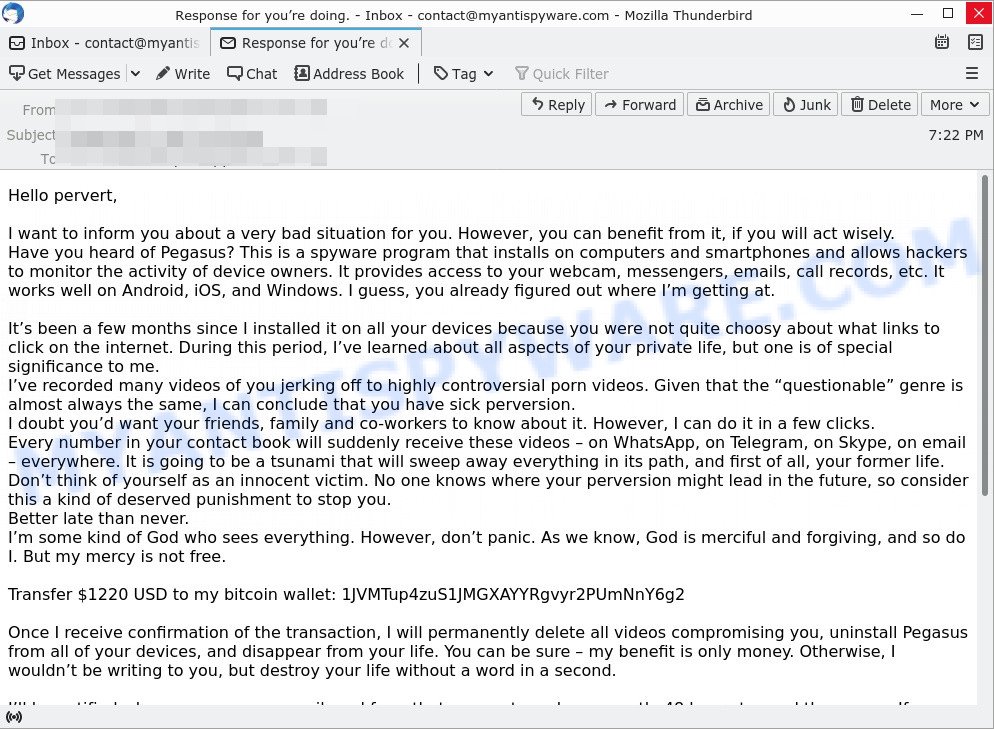
Table of Contents
Is this a scam email?
YES, this email, which starts with an unsettling greeting and asserts that the sender has used spyware to monitor your devices, is undoubtedly a scam. Known as a sextortion or blackmail scam, it aims to instill fear and urgency.
The scammer uses aggressive and intimidating language, claiming to have installed advanced spyware and recorded compromising videos of you, in an attempt to seem credible. They exploit fears of personal and reputational damage by demanding a ransom in Bitcoin for the alleged deletion of this material. However, these claims are typically baseless and designed to manipulate you into paying money unnecessarily.
Red Flags That Indicate a Scam:
- 📧 Claim of Spyware Installation: The scammer’s assertion that they have installed spyware, such as Pegasus, on your devices is a major red flag. This claim is intended to create fear and urgency but is usually fictitious.
- 🔐 Threat of Releasing Compromising Material: The threat to release compromising videos, especially with highly specific content, is designed to provoke immediate anxiety and shame. However, this is a common scare tactic, and in most cases, the scammer has no such material.
- 💸 Demand for Payment in Bitcoin: Requesting a ransom in Bitcoin underlines the scammer’s intention to stay anonymous. The use of cryptocurrency for payment is a typical sign of a scam, as it’s hard to trace and recover once paid.
- ⏰ Urgent Time Limit: Imposing a strict deadline, like a 48-hour window for payment, is a tactic to pressure you into acting quickly and without thinking. This urgency is a classic characteristic of scam emails.
- 🚫 Instructions Against Seeking Help: The scammer’s advice against contacting authorities or altering your device’s security settings is a tactic to keep you from getting help and to maintain their control over the situation.
In summary, the ‘Hello pervert, I want to inform you about a very bad situation for you’ email is a scam. The scammer uses fear, intimidation, and false claims to coerce you into paying a ransom. Do not respond or send any money. Instead, delete the email, change your passwords, enable two-factor authentication where possible, and consider reporting the incident to your email provider and relevant cybercrime authorities. Being aware and cautious is the best defense against these fraudulent schemes.
How the scam works
When an unexpected email hits your inbox with a line like “I want to inform you about a very bad situation for you“, it’s natural to feel alarmed 🚨. Such emails usually start with a shocking or offensive statement to catch you off guard. You might wonder, “How did they get my information?” Typically, these scammers don’t have your personal data; their tactic is to create fear and urgency.
The email will likely contain baseless threats, claiming they have embarrassing or compromising videos of you 🎥. The wording is intentionally vague and threatening, designed to make you worry: “Could this really be true?”
Then, the scammer might claim they’ve installed sophisticated spyware, like Pegasus, on your devices, purporting to have total access to your digital life 💻. A key sign that this is a scam is the absence of any real proof 🚩. This strategy is about using the idea of technological superiority to intimidate, not actual hacking skills.
The email inevitably leads to the money demand 💰. The scammer asks for payment in Bitcoin, betting on its anonymity and the difficulty of tracing it. They rely on creating a high-pressure situation, hoping you’ll pay quickly. However, paying doesn’t guarantee your safety and could make you a target for future scams.
As you read through the email, thoughts like, “Am I really in danger?” or “Can this person actually do what they claim?” may cross your mind 🕵️♂️. In most cases, these threats are empty, more about playing on your fears than real cyber threats.
What should you do? Responding to the scammer or paying the ransom is not advisable. Focus on your online safety: change your passwords, check your devices for actual security risks, and consider notifying the authorities if the scam involves personal threats or demands 🔐. This situation is a reminder of the need for constant awareness and proactive measures in maintaining your online security.
The email read as follows:
Hello pervert,
I want to inform you about a very bad situation for you. However, you can benefit from it, if you will act wisely.
Have you heard of Pegasus? This is a spyware program that installs on computers and smartphones and allows hackers to monitor the activity of device owners. It provides access to your webcam, messengers, emails, call records, etc. It works well on Android, iOS, and Windows. I guess, you already figured out where I’m getting at.It’s been a few months since I installed it on all your devices because you were not quite choosy about what links to click on the internet. During this period, I’ve learned about all aspects of your private life, but one is of special significance to me.
I’ve recorded many videos of you jerking off to highly controversial porn videos. Given that the “questionable” genre is almost always the same, I can conclude that you have sick perversion.
I doubt you’d want your friends, family and co-workers to know about it. However, I can do it in a few clicks.
Every number in your contact book will suddenly receive these videos – on WhatsApp, on Telegram, on Skype, on email – everywhere. It is going to be a tsunami that will sweep away everything in its path, and first of all, your former life.
Don’t think of yourself as an innocent victim. No one knows where your perversion might lead in the future, so consider this a kind of deserved punishment to stop you.
Better late than never.
I’m some kind of God who sees everything. However, don’t panic. As we know, God is merciful and forgiving, and so do I. But my mercy is not free.Transfer $1220 USD to my bitcoin wallet: 1JVMTup4zuS1JMGXAYYRgvyr2PUmNnY6g2
Once I receive confirmation of the transaction, I will permanently delete all videos compromising you, uninstall Pegasus from all of your devices, and disappear from your life. You can be sure – my benefit is only money. Otherwise, I wouldn’t be writing to you, but destroy your life without a word in a second.
I’ll be notified when you open my email, and from that moment you have exactly 48 hours to send the money. If cryptocurrencies are unchartered waters for you, don’t worry, it’s very simple. Just google “crypto exchange” and then it will be no harder than buying some useless stuff on Amazon.
I strongly warn you against the following:
) Do not reply to this email. I sent it from a temp email so I am untraceable.
) Do not contact the police. I have access to all your devices, and as soon as I find out you ran to the cops, videos will be published.
) Don’t try to reset or destroy your devices.
As I mentioned above: I’m monitoring all your activity, so you either agree to my terms or the videos are published.Also, don’t forget that cryptocurrencies are anonymous, so it’s impossible to identify me using the provided address.
Good luck, my perverted friend. I hope this is the last time we hear from each other.And some friendly advice: from now on, don’t be so careless about your online security.
All in all, this scam uses tricks to make you scared and rushed. If you receive an email like this, do not engage with the scammer and do not send any money. Instead, delete the email. It is also important to ensure that your computer has up-to-date anti-virus software and that you use strong, unique passwords for all of your accounts to reduce the likelihood of falling victim to scams like this.
Examples of such scams
Scammers have developed a variety of tactics to intimidate and exploit unsuspecting individuals. Here are a few common examples:
🔒 Your Private Information has been Stolen Email Scam
Here, the scammer will claim they’ve stolen sensitive information from you and threaten to release it unless you pay a ransom. They rely on the scare factor, hoping you’ll pay to protect your reputation, even though they likely have no data at all.
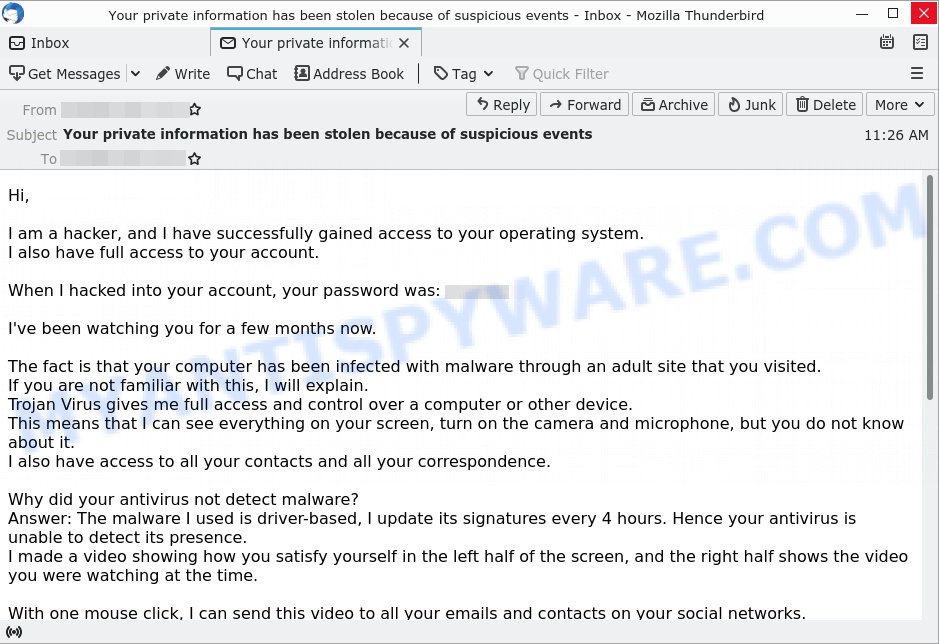
📹 I RECORDED YOU Email Scam
In this scam, the sender claims to have control over your camera and alleges they have recorded you during private moments. They typically demand payment to keep the footage private. Beware: this is a bluff to get you to pay up out of fear.
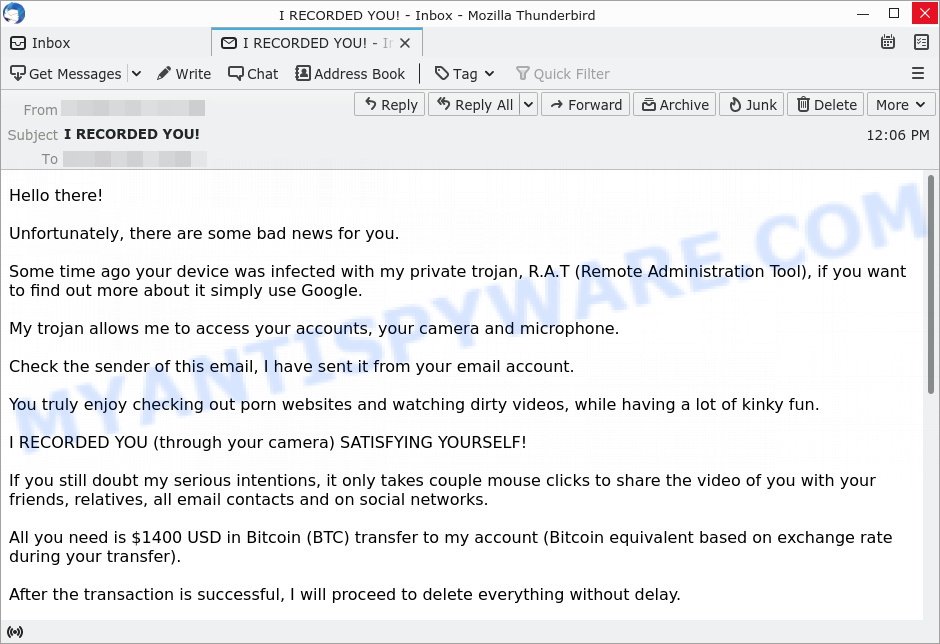
💼 I am a professional hacker EMAIL SCAM
Posing as a hacker, the sender of this email might say they’ve infiltrated your system. They may even claim they have proof of embarrassing activity and will publish it unless you send them money. Remember, a real hacker wouldn’t announce their presence—it’s a tactic to pressure you into paying.
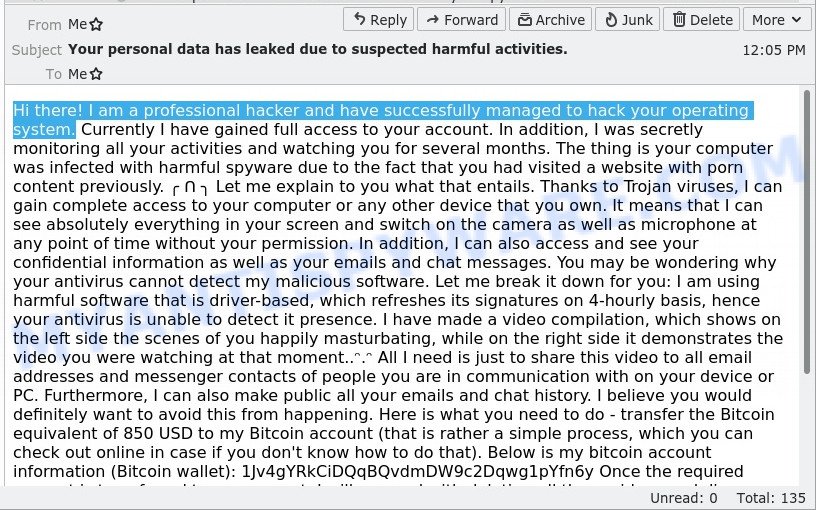
Each of these scams plays on fear and urgency to trick you into acting against your best interest. Always approach such emails with skepticism, verify your security, and do not engage with the scammers.
Should you pay?
No, you should not pay the ransom demanded by the scammer. Remember that this is a scam and paying the ransom will only encourage the scammer to continue their criminal activities! Additionally, paying the ransom can make you a target for future scams. It is important to stay vigilant and protect your personal information from such scams by using strong and unique passwords, enabling two-factor authentication, and regularly updating your computer’s security software. If you receive such an email, it is best to report it to the authorities and your email provider.
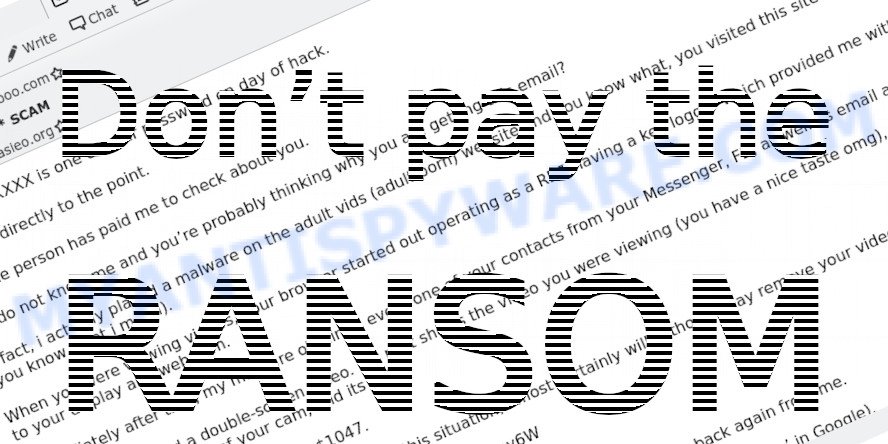
What to Do if You Receive the Email
Receiving the “I want to inform you about a very bad situation for you” email can be deeply unsettling, but with the right steps, you can ensure safety and peace of mind.

Here’s a specific guide on handling this scam:
Begin by reminding yourself to stay calm. The email is crafted to elicit panic, pushing recipients into rash decisions. Recognize its true nature—a manipulative attempt to exploit fear.
Resist any impulses to pay. Even if you’re tempted to make the problem go away, understand that payment doesn’t guarantee safety. It merely emboldens the scammer, possibly marking you as an easy target for future deceptions.
Do not engage with the scammer. Replying or trying to open a dialogue can inadvertently give away more information, or signal that your email is active, making you a prime candidate for further scams.
Seeing a familiar password can be particularly jarring. If the scam email mentions a password you recognize, it’s essential to check its source. Use services like haveibeenpwned.com to see if your email or credentials have been compromised in any past data breaches.
Subsequent to that, update your passwords. Always choose strong, unique combinations and activate two-factor authentication on platforms that support it.
As a precaution, run a comprehensive security scan on your device. While the scam email’s claims about malware are usually baseless, this step ensures your system remains clean and threat-free.
Report the email to relevant authorities (e.g., FTC). Sharing details with your local law enforcement or cybercrime units can contribute to ongoing investigations and aid in the crackdown on such malicious activities.
Lastly, spread awareness. Inform friends, colleagues, and family about the scam, equipping them with the knowledge to recognize and sidestep such threats. Knowledge, shared and acted upon, diminishes the effectiveness of these scams, making the digital world a bit safer for everyone.
Threat Summary
| Name | Hello pervert, I want to inform you about a very bad situation for you. |
| Type | Phishing/Sextortion |
| Email Subject | Response for you’re doing. |
| Ransom amount | $1220 USD (in Bitcoin equivalent) |
| Bitcoin Address | 1A28fiWUfQnqEMqoDmMf7KZcjSDY7mEjfs, 1Abx3eY5pHFE1aC4AJLdU91qhHS5rzqP4E, 1FXXt4n3GnZKGJeK4LkHmZdKxwpgMwS67e, 1JVMTup4zuS1JMGXAYYRgvyr2PUmNnY6g2 |
| Fake Claims | Compromised data, webcam access, malware/backdoor installed |
| Damage | Psychological distress, potential financial loss if ransom is paid |
| Distribution | Mass emailing, likely from a purchased or hacked email list |
| Tactics | Fear induction, urgency, deception |
| Variations | Different ransom amounts, varying email content, alternative cryptocurrencies for payment |
| Prevention Tips | Use strong, unique passwords; enable two-factor authentication; be skeptical of unsolicited emails; never pay ransoms |
| Reporting Info | Forward to the Anti-Phishing Working Group at reportphishing@apwg.org; Report the scam to relevant authorities (e.g., FTC); Share information about the scam with friends and family to raise awareness; Monitor online accounts for any suspicious activity |
Conclusion
The “I want to inform you about a very bad situation for you” email scam is a classic example of how scammers use fear tactics to extort money. These scammers employ fear-mongering tactics, pretending to have compromising information or videos of you. However, their claims of having spyware like Pegasus installed on your devices are almost certainly false. These scammers present themselves as all-seeing and all-knowing, often claiming they have recorded you in private moments and threatening to share these videos with your contacts. They might demand payment in Bitcoin, taking advantage of its anonymity. But remember, their supposed evidence and capabilities are likely non-existent.
Bottom Line: Do not engage with or respond to such emails. Protect yourself by ignoring their demands and focusing on your online security. 🛡️💻
Stay alert and rational; if you receive an email that triggers immediate fear or seems too sophisticated to be true, it likely is a scam. 🤔















